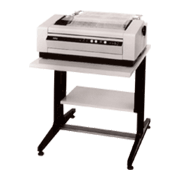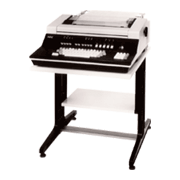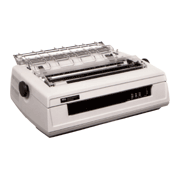In June 1975, NEC announced these "intelligent printers", which achieved high-speed, high-reliability and low-cost, and began sales as systems, standalone units and OEM.
These printers eliminated mechanical parts, reduced the number of parts to 1/10 the previous amount. By converting 80% of the equipment to electronics and using microcomputers, the system achieved higher speed, low noise, high reliability, maintenance-free performance, smaller size and lower cost.
The NB-3000 "Badminton printer" employed a plastic molded type head, which weighed about 6g and was shaped like a badminton shuttlecock. It had a printing speed of 40char/s, and could print 128 character types.
The NH-3000 "High Printer" could print at a high-speed of 180char/s using the dot impact system.
These printers had diagnostic/testing functions.
Cumulative orders for the NB-3000 exceeded 16,000 units by March 1978.
The SP-40 badminton printer was marketed to personal and office use, and two years later it secured the top share in Japan. Exports to North America began in 1976 under the name "Spinwriter", and successor machines held the top 3 slots in terms of market share in the early 1980s.
In 1978, NEC announced the NB-3300 and NH-3300 which further enhanced performance and reduced size and weight of the above models. Throughput was improved by 30–40% over previous machines due to the improved printing speed, bidirectional printing, and one-step advance for continuous spaces and linefeeds. It also enabled output of high-density graphs.
Even with the power supply built-in, weight was halved, and length in the depth direction was reduced by 1/3.
| Model name | High Printer NH-3000 |
Badminton printer NB-3000 |
High Printer NH-3300 |
Badminton Printer NB-3300 |
|---|---|---|---|---|
| Printing system | 7×9 dot | Static type | 7×9 dot | Static type |
| Character types | Alphabetic, Numeric, Kana, Symbols 128 types total | |||
| Max. number of printed characters | 132char/line | 136 or 163char/line | ||
| Character spacing (char/inch) |
10 | 10 or 12 | ||
| Line spacing (line/inch) |
3 or 6 | 6 or 8 | ||
| Copy capability | 5sheets, including original | 6sheets, including original | ||
| Printing speed (char/s) |
180 | 40 | - | 55 |
| Printing noise | 60phon Max. | |||
| External dimensions(mm) Model without keyboard | 600(W)×455(D)×225(H)(Without power supply section) | 600(W)×415(D)×210(H) | ||
| Weight(kg) | 35(without power supply section) | 33(without power supply section) | 24 | 24 |
| Announcement date | June 1975 | September1978 | April 1978 | |




